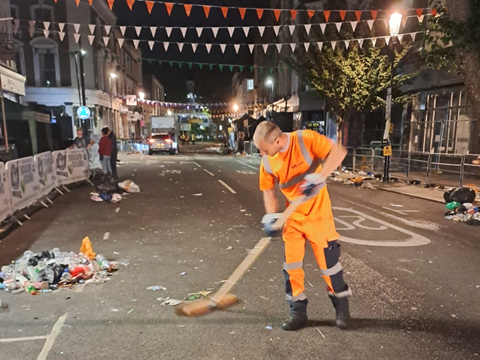
One week after Notting Hill Carnival, an annual street party celebrating Caribbean culture, SUEZ reports that it has cleaned up 330 tonnes of waste left behind by attendees – subsequently recycling 30% of the load.
The carnival took place over the bank holiday weekend (Sunday 24th – Monday 25th August) on the streets of North Kensington and Westminster, London. SUEZ leads the Royal Borough of Kensington and Chelsea’s street cleaning and waste collection teams and has been responsible for cleaning up after the festivities since 1997.
Operating under a ‘tried-and-tested’ operational plan, SUEZ deployed 180 staff and 45 waste collection vehicles from its depot at around 10:00 PM every evening, clearing the streets to allow for normal schedules to resume from Tuesday 26th August. Street cleaning teams and graffiti removal experts also helped to refresh the streets.
For the third year in a row, dedicated tip containers were implemented for gas canisters – keeping them out of general waste streams and preventing fires and explosions caused by incorrect disposal.
Councillor Johnny Thalassites, lead member for environment and planning at the Royal Borough of Kensington and Chelsea, commented: “Our communities rightly expect their streets to be back to normal and ready for business by Tuesday morning after Carnival, and we’re very proud to deliver that year in, year out.
“It’s a major operation and I am in awe of the hard-working men and women in our waste crews who work tirelessly through the night to collect the rubbish on Sunday and Monday.
“The work didn’t stop there with extra jet-washing and graffiti cleaning throughout the week following the bank holiday weekend so that the streets quickly return to their usual condition.”
“Every year, cleaning up after Notting Hill Carnival is an enormous operation,” added Gary O’Hagan, regional manager at SUEZ. “Over the weekend, SUEZ teams worked through the night to collect more than 300 tonnes of waste and recycling – ensuring about 30 per cent of the waste collected is recycled.
“It’s always incredible to see how planning, teamwork, and experience come together to restore the streets so quickly – everything was cleared by Tuesday morning, with our crews working diligently to make sure the area is safe, tidy, and ready for the week ahead.
“We’re proud of the role we play in helping such a landmark event run smoothly, and grateful to everyone involved in making the clean-up as efficient and thorough as possible.”
Clean-up efforts persist overseas; to name one example, Plastic Bank and EZVIZ teaming up to remove 20,000 kilograms of plastic waste from the environment. By encouraging waste collectors to exchange retrieved plastic waste for income and social benefits, the companies hope to support informal waste workers across Southeast Asia, Latin America, and Africa.
Similar to gas canisters, batteries have caused concern around fires and waste sorting facilities. Two separate fires at Hündgen Entsorgungs’ Swisttal-Ollheim facility have led the industry to back a deposit system for lithium-ion batteries and legislative reform to make battery disposal safer.
If you liked this story, you might also enjoy:
The ultimate guide to the Packaging and Packaging Waste Regulation in 2025
How are the top brands progressing on packaging sustainability?
Everything you need to know about global packaging sustainability regulation in 2025
The key to increasing the use of reusable packaging in supermarkets














No comments yet